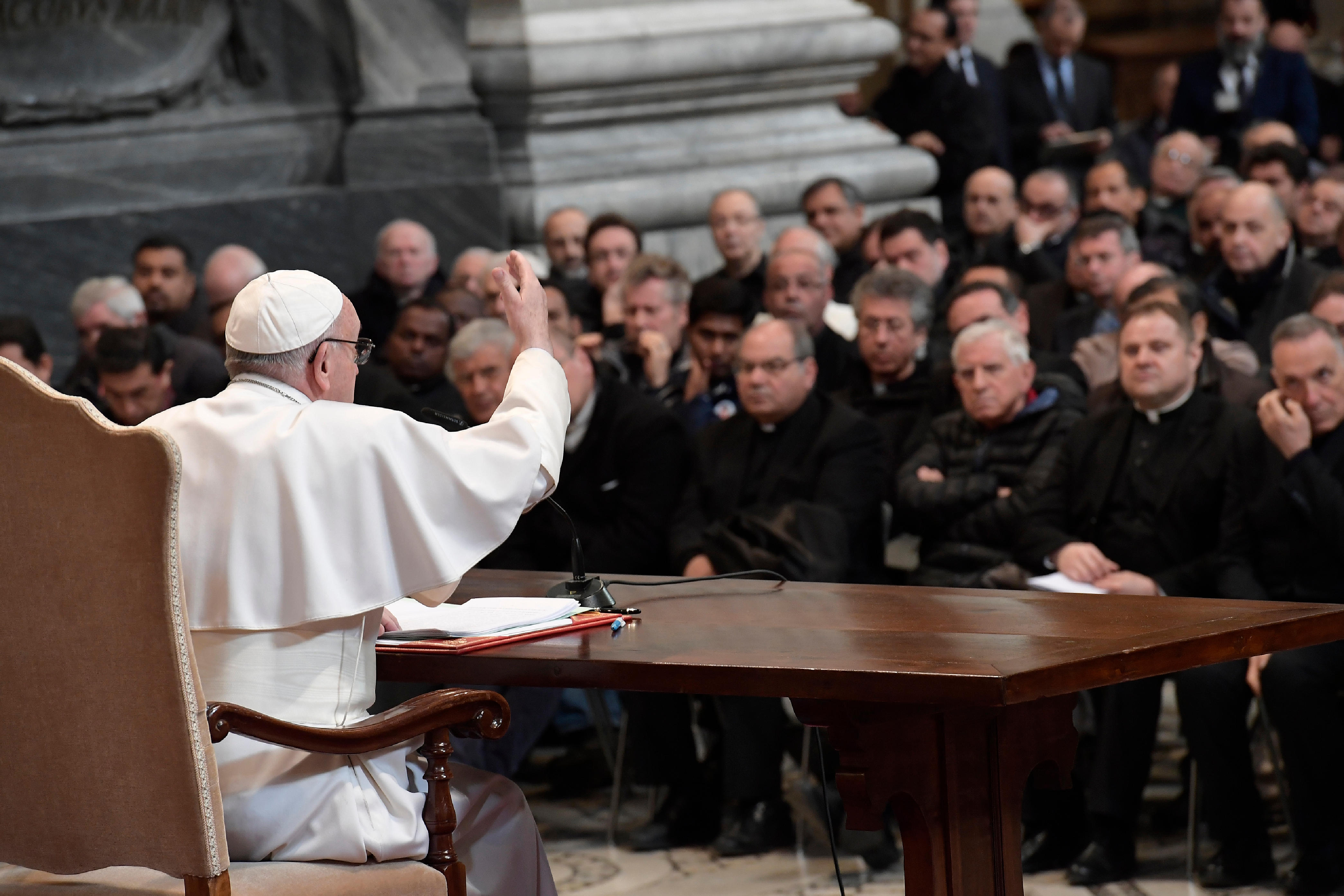To Rome parish priests
The meeting with Rome’s priests held annually at the beginning of Lent began with a surprise: the Pope as a confessor. Then a long meditation read only in part and that continued ad lib, on the progress of faith in the life of the priest at the end of which Francis gave to parish priests a book on “a great confessor” whom he met in Buenos Aires

The traditional meeting held at the beginning of the Lenten period with Rome’s parish priests, held on the Thursday that follows Ash Wednesday, began with a surprise. The Pope arrived punctually at 11 in the Basilica of St John Lateran, but before starting his meditation – one of the longest ones delivered to the clergy – he chose to confess a number of priests, thereby revolutionising the timetable of the meeting. Fifty minutes later, Francis began his impromptu speech:
“If faith does not grow it remains immature: there are priestly lives that remain unfulfilled because the faith has not grown. Without a mature faith, capable of kindling faith in others, there is the risk to do harm, great harm.”
The theme of the reflection that the Pope read only in part, adding extempore expressions, is: “The progress of faith in the life of the priest.” Three main points: memory, hope and the discernment of the moment. The latter is “what makes faith concrete, that is, ‘faith expressed through love’ (Gal 5:6), that permits us to give credible witness.” Before leaving the Pope presented Rome’s priests with the book “Don’t be afraid to forgive”, by Fr Luis Dri, 90, “a great confessor” whom Francis met in Buenos Aires.
In Saint John Lateran Pope Francis made repeated reference to Evangelii Gaudium, defined as a programmatic document. The Pope used a sports metaphor of the basket player who plays with a foot nailed to the ground and makes various movements to protect the ball and find a way to pass it on, or taking a run-up and scoring. For us, that foot nailed to the ground that acts as our pillar, is the Cross of Christ.
“There can be no faith without memory. The Christian faithful always progress in memory.”
The Pope recalled ad lib: God is the God of our fathers and grandfathers. He is not a last-minute God, a God without a family history. He never goes out of fashion: like the sepia-coloured clothing and images of our photo albums.
“Faith can even ‘progress’ backwards – he added – seeking treasures and experiences that had been forgotten and that often hold the key to understanding the present.”
There can also be a revolutionary return to the roots: like when, Francis said, at a moment of interruption during spiritual exercises the memory of a card from our grandmothers is enough to make us go on: “Remember that God is looking at you. You never know when you will die.”
In the Pope’s meditation we find St. Ignatius, when explaining that taking a step back, to better see the view, pertains to discernment. Say NO to “sterile pessimism” the Pope remarked.
In order to quench other people’s thirst we have to serve as amphoras.
Temptation, always present in the life of Saint Peter, as in ours, is the theme of the second part of Francis’ meditation. We progress in faith by putting ourselves to the test, and sin is part of this itinerary:
“Peter committed the worst sin – to deny the Lord – and yet he became Pope. A priest, a bishop, who doesn’t acknowledge himself as a sinner, who doesn’t confess, is closed in himself and fails to progress in the faith.”
When Jesus prays for Peter he is also thinking of us, Francis assured. But sometimes, the burden of our sins draws us away from God. Saint Peter’s faith is a proven faith, and that’s why his mission is to confirm and to consolidate the faith of his brothers, our faith. Simon’s faith is slower that the faith of Mary Magdalene and of John; it experiences moments of greatness and of serious mistake, of deep fragility and utter disconcertment. Nonetheless Peter is the icon of the man that through Jesus makes constant acts of faith.
From him, the Pope said, comes “a unique lesson: the lesson of the Lord who confirms His faith so that he may confirm that of his people. That is life. We pray to Peter to confirm us in the faith, so that we may confirm that of our brothers.”